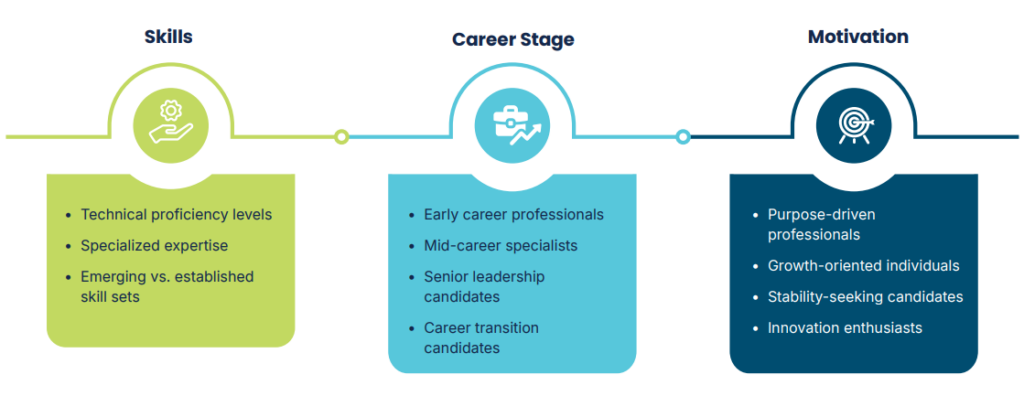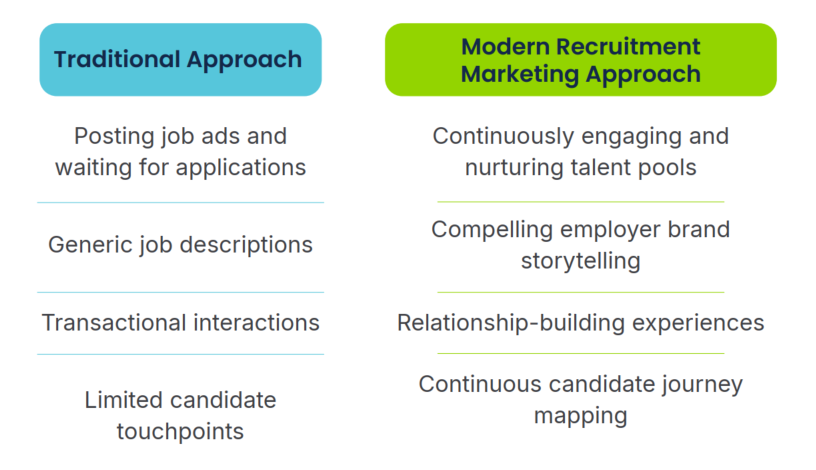Your social media posts are getting thousands of impressions. Your follower count is steadily climbing. Your engagement rate looks healthy in the monthly report you present to leadership. But are you actually attracting better candidates? Are quality applicants discovering your organization through social media? Is your employer brand genuinely influencing hiring outcomes?
For most talent acquisition leaders, these questions are surprisingly difficult to answer. That’s because the metrics we’ve been conditioned to track—impressions, followers, likes—don’t tell the full story of recruitment impact. In fact, these vanity metrics often mask what truly drives recruitment outcomes, giving a false sense of success while actual hiring challenges persist.
It’s time for a more sophisticated approach to social media metrics for recruitment.
The Vanity Metrics Trap
Let’s be clear about what vanity metrics are: they’re numbers that look impressive in reports but don’t necessarily correlate with business outcomes. A post with 50,000 impressions sounds successful, but if none of those viewers became applicants, what did that impression count actually achieve?
Similarly, having 10,000 followers means nothing if those followers aren’t your target candidates, aren’t engaging with your content and aren’t ultimately applying to your open positions.
It’s not that these metrics are completely worthless; they provide useful context. The problem is when organizations stop there, mistaking high-level awareness metrics for actual recruitment impact. They optimize for what’s easy to measure rather than what actually matters.
This creates a dangerous disconnect. Your social media team celebrates viral content while your recruiting team struggles to fill critical roles. Your follower count grows while application quality declines. You’re winning at metrics that don’t correlate with the outcomes you actually need.
The Three-Dimensional Framework for Social Media Metrics for Recruitment
To truly evaluate effectiveness, talent acquisition leaders can draw on PeopleScout’s Outthink Index, which measures employer brand performance across three social media dimensions: Impact, Authority and Reach. Together, they reveal whether social media efforts are moving the needle on hiring outcomes.
1. Social Impact (Engagement & Influence)
Social Impact measures how deeply candidates are engaging with your content and whether that engagement translates into recruitment outcomes. This dimension answers the question: “Is our content actually influencing candidate behavior?”
What to Track:
- Depth of Engagement – Look beyond likes to metrics that indicate genuine interest: comments that ask substantive questions, saves that suggest candidates want to reference your content later, shares that mean people are recommending your content to their networks, and click-throughs to your careers site or specific job pages. When someone saves your post about career development opportunities, that’s a candidate seriously considering your organization.
- Applicant Conversion from Social Campaigns – Track how many applicants cite social media as their source of discovery. Use UTM parameters on links shared through social channels to understand which platforms and which types of content drive the most applications. But don’t stop at volume. Track conversion rates: if a post drives 1,000 clicks to a job posting but generates only five applications, something is misaligned between your social messaging and the actual opportunity.
- Quality of Social-Sourced Applicants – This is perhaps the most important metric, yet it’s the one organizations most often neglect. Of the applicants who discovered you through social media, what percentage advance past initial screening? How do their assessment scores and interview performance compare to applicants from other sources? What’s their offer acceptance rate and retention rate once hired? If social media is driving volume but not quality, you need to reconsider your messaging, targeting or both.
Why This Matters:
Our research shows that 86% of job seekers say a company’s social media presence influences their decision to apply. But influence only matters if it’s positive influence on the right candidates. Social Impact metrics tell you whether your content is actually moving qualified candidates toward application.
2. Social Authority (Voice & Credibility)
Social Authority measures whether your employer brand carries weight in the marketplace. This dimension answers the question: “Are we a credible, respected voice that shapes conversations about our industry and workplace culture?”
What to Track:
- Share of Voice – Monitor how frequently your organization is mentioned in social conversations relative to your competitors. When people talk about employers in your sector, is your organization included in those conversations? Tools like social listening platforms can track mentions, hashtags and brand references across channels.
- Online Sentiment – Are conversations about your employer brand generally positive, neutral or negative? Are current and former employees speaking positively about their experiences? Are industry professionals recommending your organization? Pay particular attention to unsolicited mentions—times when people discuss your organization without being prompted by your content. These organic conversations reveal your authentic reputation in ways that company-created content cannot.
- Thought Leadership – Monitor how frequently your executives and employees are recognized as knowledgeable voices in your field. Are your leaders speaking at industry events? Are employees sharing expertise that gets traction? Thought leadership from your team members elevates your entire employer brand. When candidates see your people recognized as experts, it signals that your organization attracts and develops top talent.
Why This Matters:
Candidates don’t just evaluate job postings; they’re gauging your organization’s credibility and authority in the market. Authority metrics reveal whether you’re shaping conversations or being left out of them. In competitive talent markets, authority can be the differentiator that drives candidates to prioritize your opportunities over similar roles elsewhere.
3. Social Reach (Community Growth & Visibility)
Social Reach measures how effectively you’re expanding your employer brand’s footprint and whether your content is traveling beyond your immediate audience. This dimension answers the question: “Are we reaching new talent pools and building a sustainable community?”
What to Track:
- Follower Growth Rates – Are you attracting followers who match your target candidate profiles? Are you growing your presence among the demographics you’re trying to reach? Track follower growth by platform and analyze demographic data when available. Growing your Instagram following among early careers professionals is valuable if you’re recruiting for entry-level positions. Growing your LinkedIn following among senior executives is valuable if you’re recruiting for leadership roles.
- Reach Beyond Immediate Networks – The most powerful social media content travels beyond your existing followers through shares, employee advocacy and earned media. Track how often your content is shared by people outside your organization, mentioned by industry influencers or picked up by media outlets or other brands. This extended reach gives you access to passive candidates who aren’t actively following your channels but encounter your content through their networks.
- Referral Traffic from Social to Career Sites – Monitor how much traffic your careers site receives from each social platform as well as behavior once candidates arrive. Are social-referred visitors spending time exploring multiple pages? Are they browsing various job openings? Are they signing up for job alerts or talent communities? High-quality referral traffic suggests your social content is attracting genuinely interested candidates rather than drive-by clicks.
Why This Matters:
Reach demonstrates how effectively you’re expanding your employer brand’s visibility and accessing new talent pools. With hard-to-find talent, the ability to reach candidates who aren’t actively searching for jobs—but might be persuaded by compelling content—can be a critical competitive advantage.
Implementing the Framework
This three-dimensional approach moves you beyond “what’s easy to measure” to tracking what truly matters: meaningful connections with candidates, brand credibility in the marketplace and long-term audience growth.
Start by establishing baselines for each dimension, then track quarterly trends rather than scrutinizing daily fluctuations. Leveraging social media for recruitment is a long-term strategy, and meaningful change happens over months, not days.
Most importantly, connect these metrics to actual hiring outcomes. Analyze the relationship between your social media performance across these three dimensions and your recruitment results: time-to-fill, cost-per-hire, application volume and quality, offer acceptance rates and new hire retention.
The Social Media Metrics for Recruitment That Matter
Recruitment success in social media isn’t about impressive numbers in isolation—it’s about whether your social presence is actually helping you attract and hire the right talent. By measuring Social Impact, Social Authority and Social Reach, you gain a comprehensive understanding of your recruitment effectiveness.
The organizations that win at social media recruitment don’t chase vanity metrics. They track what matters, optimize based on outcomes and build sustainable strategies that deliver real recruitment results.
Ready to Build a Data-Driven Social Media Strategy for Recruitment?
Understanding what to measure is just the beginning. For a complete framework including platform-specific strategies, authentic content creation approaches, community management tactics and detailed guidance on implementing the three-dimensional measurement approach, download our comprehensive guide: Social Media for Talent Acquisition: Building Your Employer Brand in the Digital Age.


